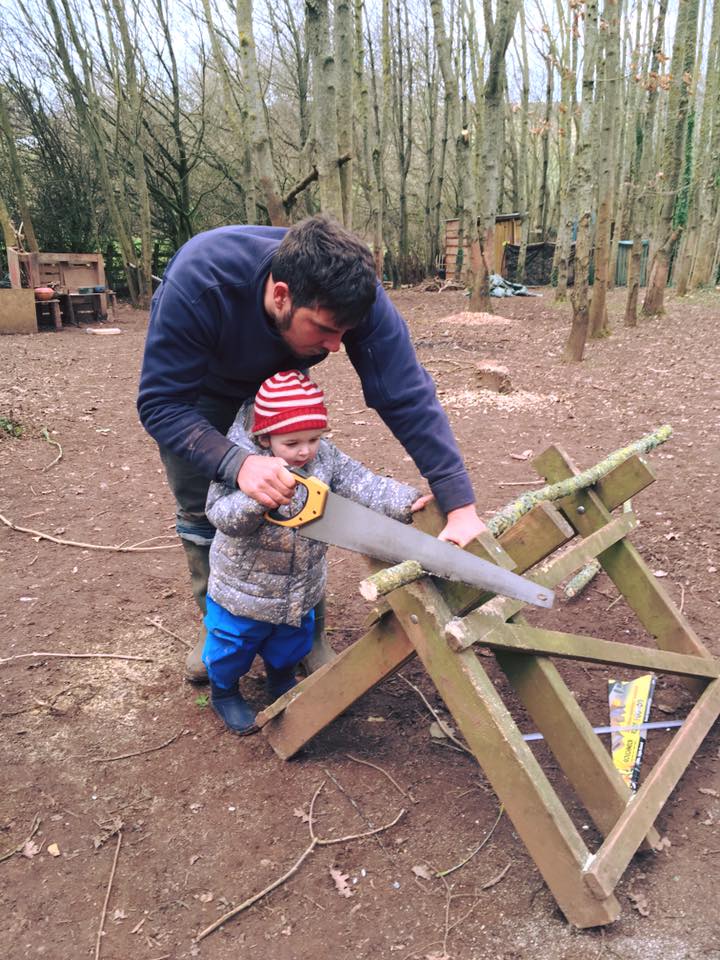
You let them do what?!
Whilst most people these days are on board with the idea of children of all ages spending time learning through nature, in a forest school or other outdoor setting, there is one element of what we do that still often raises eyebrows and concern from well meaning parents, relatives and general observers. It’s not fire lighting or climbing tall trees, but the use of real, often adult-sized tools for woodworking and crafts. This is especially apparent if you talk about toddlers using tools for sawing, drilling and knives to work on a variety of handmade creations. From woodland creatures to candle holders and magic wands, there is so much potential for kids to let their imaginations run wild with the plethora of natural materials available in the forest.
Often though, in order to bring their ideas into reality, they need to saw a branch to the right size, to drill holes in appropriate places or to whittle a little. And yes, the leaders could do it for them but then we’d be taking away from them the experience of seeing something transformed in their hands and the satisfaction of having concentrated and worked carefully to create whatever fantasical item it is they have dreamt up. But the sight of a three year old grasping onto a bow saw or of a child you know to be accident prone sitting with a sharp knife is still enough to make the blood run cold in some parents.
However, we’d argue that with the right instruction and supervision, children (even very young ones) are perfectly capable of safely using these tools. Jean Liedolff, author of the Continuum Concept, argues that children from a very young age have a very strong sense of self preservation and that often, it is the intervention of (well-meaning but overly cautious) care-givers that prevents them from developing this as they grow. She says;
‘The point is that we’re all born with our instincts, but we’re taught by the culture from very early on not to respect them and to doubt them. So it’s a question of recognizing that we have instincts, and then honoring them,
Part of the trouble is the way we keep suggesting to children that they’re going to hurt themselves. We don’t seem to have even a faint notion of how powerful our authority is in their eyes. We put gates at the tops of stairs, and then we accidentally leave it open one day and down they plunge because the suggestion was so strong that, if the gate isn’t locked, then they are going to fall. But if there were no gate they wouldn’t fall.
You don’t try to prevent cows, or sheep or pussycats from falling. They don’t trip over the edges of cliffs. We think that homo sapiens are the only ones stupid enough to do that. We don’t trust our children not to walk into a fire, but we trust puppy dogs and kittens. The truth of the matter is that we’re much better at preserving ourselves than we realize.’
This would suggest that this interrupting of a child’s natural instincts could lead to older children lacking common sense and the skills necessary to assess potentially dangerous situations and act accordingly to keep themselves (and others) safe. At Forest School, we want to help children develop their natural sense of self-preservation and to learn to trust their instincts.
Obviously we aren’t going to just plonk them down in front of a pile of tools and wander off though, so what do we do? We introduce the use of tools in an age-appropriate and calm environment. We demonstrate how to use them safely, we talk about what could happen if we didn’t use them in a correct manner. And then we observe closely and guide them as they learn to use them themselves. We gently correct if we see a potential danger and assist where required but we take a step back and let them figure it out in a safe space. And the key to all of this is respect. We want to show that we respect the children to use them safely, we want to teach that you respect the tools and that your respect those around you whilst you are using them. And if we see someone demonstrating a lack of respect or having a lapse in concentration whilst using them, we suggest donning the tools for now and revisiting them at a later date.
Some people still don’t understand why we bother with woodworking and using these tools when there is so much else to do in the woods but we believe that there are very particular transferable skills to be gained through these activities. We are helping our attendees to identify dangers in any given situation and to develop their instincts on how to behave to keep themselves safe and to respect others. As they get older these skills will be able to be applied to a vast number of situations from assessing whether jumping off a cliff into unknown waters is a good idea to deciding whether going into a mosh pit at a heavy metal gig when you’ve hurt your leg is sensible!
Being able to assess a situation and form your response to it based on experience, risk-benefit analysis and mutual respect is an absolutely amazing skill to have at any age and this is why we continue to let children of all ages use potentially dangerous tools in a safe, supervised setting whilst in the woods with us.
Reference: http://www.continuum-concept.org/reading/JFL-interview.html
Author: Hannah Durdin
Copyright © Outdoors Group Ltd 2021. All Rights Reserved.
Registered Office: The Outdoors Group, Western Lodge, Crediton, Devon, EX17 3NH. Company number 10755829
Terms & Conditions / Website Terms / Privacy Policy / Sitemap / Built with ♥ by Solve